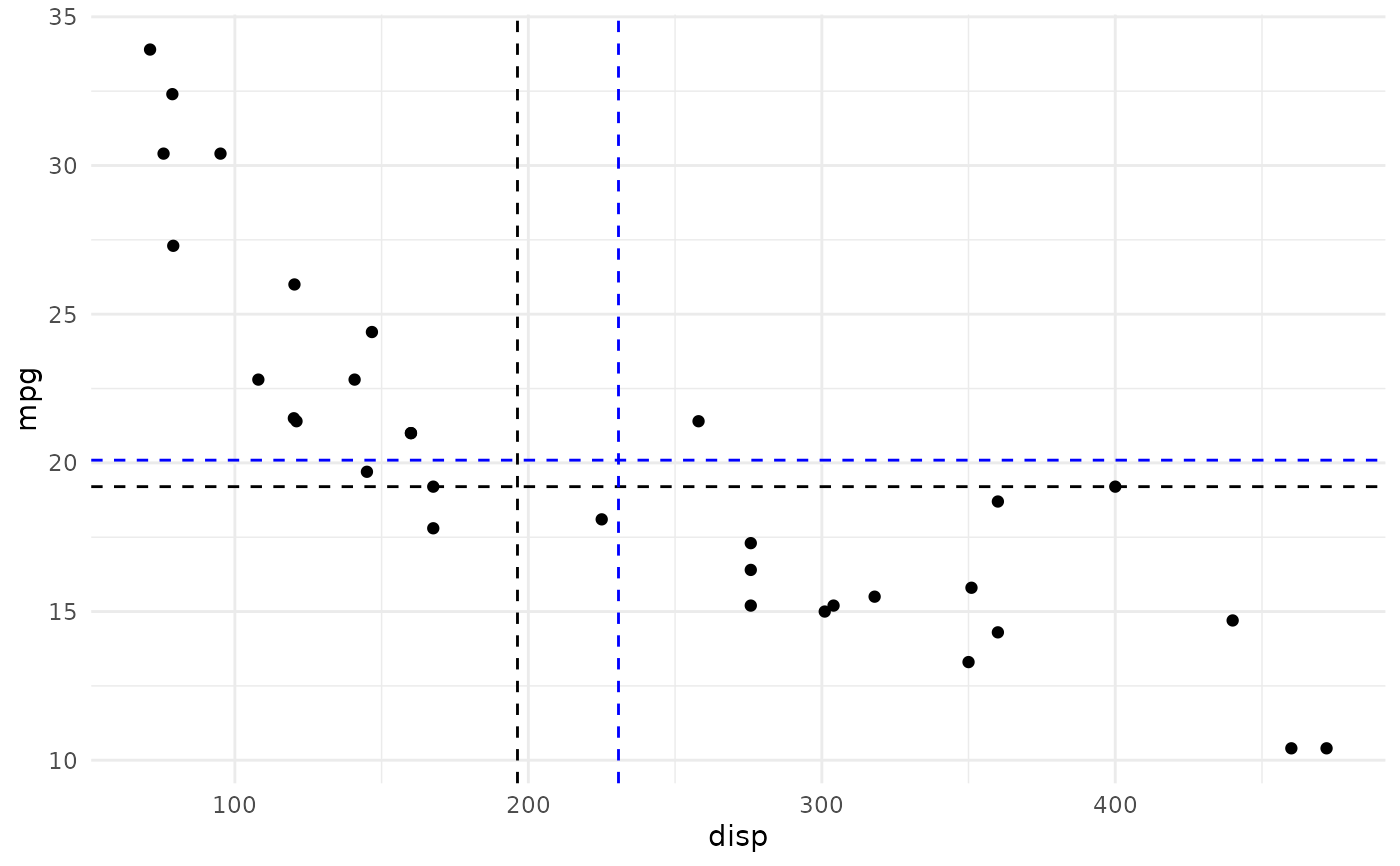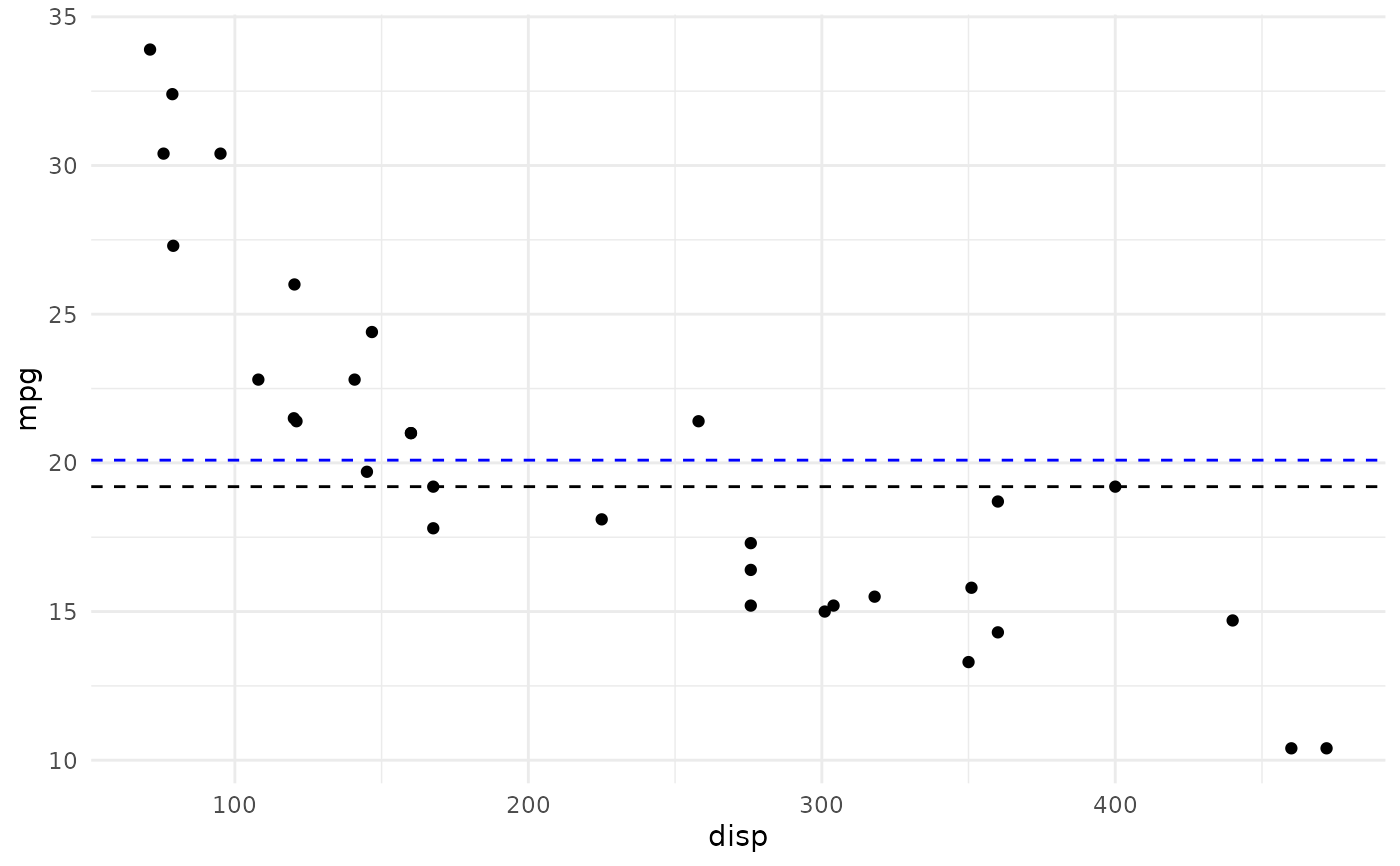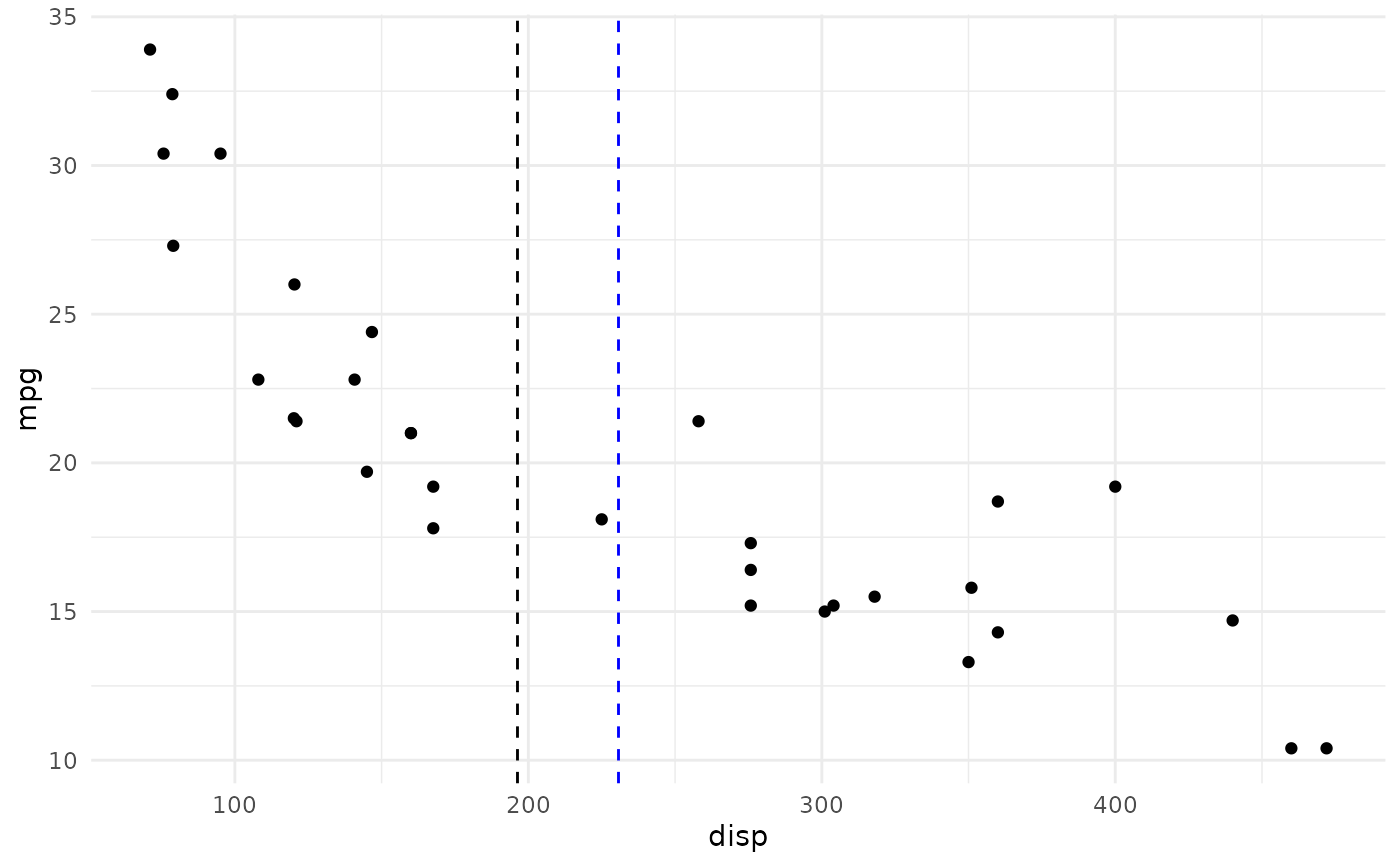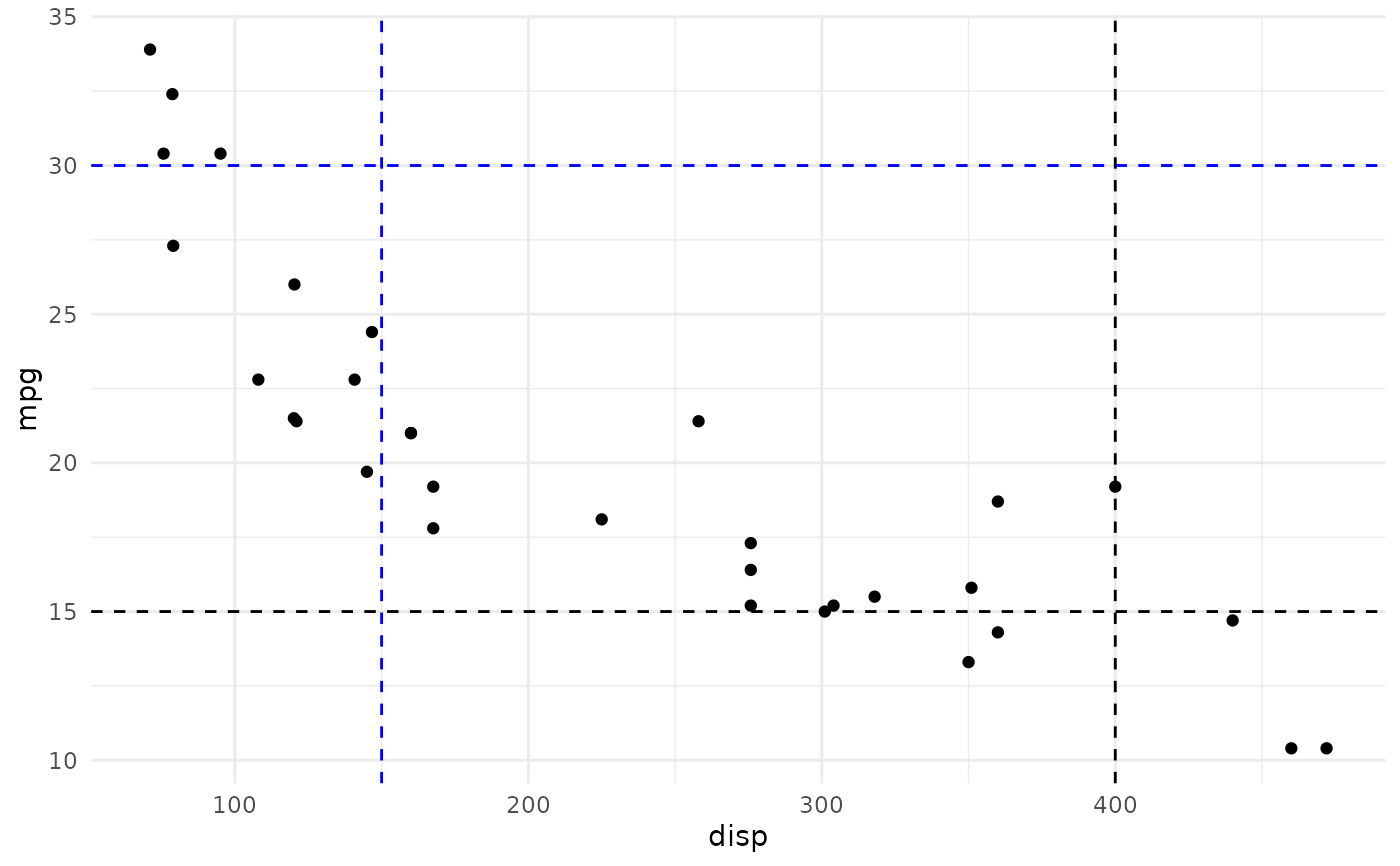These geoms can be used to draw horizontal or vertical reference
lines in a ggplot. They use the data in the aesthetics v_var and h_var
to compute their median or mean and draw the as a line.
Usage
geom_median_lines(
mapping = NULL,
data = NULL,
...,
na.rm = FALSE,
show.legend = NA,
inherit.aes = TRUE
)
geom_mean_lines(
mapping = NULL,
data = NULL,
...,
na.rm = FALSE,
show.legend = NA,
inherit.aes = TRUE
)Arguments
- mapping
Set of aesthetic mappings created by
aes().- data
The data to be displayed in this layer. There are three options:
If
NULL, the default, the data is inherited from the plot data as specified in the call toggplot().A
data.frame, or other object, will override the plot data. All objects will be fortified to produce a data frame. Seefortify()for which variables will be created.A
functionwill be called with a single argument, the plot data. The return value must be adata.frame, and will be used as the layer data. Afunctioncan be created from aformula(e.g.~ head(.x, 10)).- ...
Other arguments passed on to
layer()'sparamsargument. These arguments broadly fall into one of 4 categories below. Notably, further arguments to thepositionargument, or aesthetics that are required can not be passed through.... Unknown arguments that are not part of the 4 categories below are ignored.Static aesthetics that are not mapped to a scale, but are at a fixed value and apply to the layer as a whole. For example,
colour = "red"orlinewidth = 3. The geom's documentation has an Aesthetics section that lists the available options. The 'required' aesthetics cannot be passed on to theparams. Please note that while passing unmapped aesthetics as vectors is technically possible, the order and required length is not guaranteed to be parallel to the input data.When constructing a layer using a
stat_*()function, the...argument can be used to pass on parameters to thegeompart of the layer. An example of this isstat_density(geom = "area", outline.type = "both"). The geom's documentation lists which parameters it can accept.Inversely, when constructing a layer using a
geom_*()function, the...argument can be used to pass on parameters to thestatpart of the layer. An example of this isgeom_area(stat = "density", adjust = 0.5). The stat's documentation lists which parameters it can accept.The
key_glyphargument oflayer()may also be passed on through.... This can be one of the functions described as key glyphs, to change the display of the layer in the legend.
- na.rm
If
FALSE, the default, missing values are removed with a warning. IfTRUE, missing values are silently removed.- show.legend
logical. Should this layer be included in the legends?
NA, the default, includes if any aesthetics are mapped.FALSEnever includes, andTRUEalways includes. It can also be a named logical vector to finely select the aesthetics to display.- inherit.aes
If
FALSE, overrides the default aesthetics, rather than combining with them. This is most useful for helper functions that define both data and aesthetics and shouldn't inherit behavior from the default plot specification.
Value
A ggplot2 layer (ggplot2::layer()) that can be added to a plot
created with ggplot2::ggplot().
Aesthetics
geom_median_lines() and geom_mean_lines() understand the following
aesthetics (at least one of v_var and h_var are required):
v_var- The variable for which to compute the median/mean that is drawn as vertical line.
h_var- The variable for which to compute the median/mean that is drawn as horizontal line.
alpha = NA- The alpha channel, i.e. transparency level, as a numerical value between 0 and 1.
color = "black"- The color of the drawn lines.
linetype = 2- The linetype of the drawn lines.
linewidth = 0.5- The size of the drawn lines.
See also
The underlying ggplot2 geoms ggplot2::geom_hline() and ggplot2::geom_vline()
Examples
# \donttest{
library(mlbplotR)
library(ggplot2)
# inherit top level aesthetics
ggplot(mtcars, aes(x = disp, y = mpg, h_var = mpg, v_var = disp)) +
geom_point() +
geom_median_lines() +
geom_mean_lines(color = "blue") +
theme_minimal()
 # draw horizontal line only
ggplot(mtcars, aes(x = disp, y = mpg, h_var = mpg)) +
geom_point() +
geom_median_lines() +
geom_mean_lines(color = "blue") +
theme_minimal()
# draw horizontal line only
ggplot(mtcars, aes(x = disp, y = mpg, h_var = mpg)) +
geom_point() +
geom_median_lines() +
geom_mean_lines(color = "blue") +
theme_minimal()
 # draw vertical line only
ggplot(mtcars, aes(x = disp, y = mpg, v_var = disp)) +
geom_point() +
geom_median_lines() +
geom_mean_lines(color = "blue") +
theme_minimal()
# draw vertical line only
ggplot(mtcars, aes(x = disp, y = mpg, v_var = disp)) +
geom_point() +
geom_median_lines() +
geom_mean_lines(color = "blue") +
theme_minimal()
 # choose your own value
ggplot(mtcars, aes(x = disp, y = mpg)) +
geom_point() +
geom_median_lines(v_var = 400, h_var = 15) +
geom_mean_lines(v_var = 150, h_var = 30, color = "blue") +
theme_minimal()
# choose your own value
ggplot(mtcars, aes(x = disp, y = mpg)) +
geom_point() +
geom_median_lines(v_var = 400, h_var = 15) +
geom_mean_lines(v_var = 150, h_var = 30, color = "blue") +
theme_minimal()
 # }
# }
